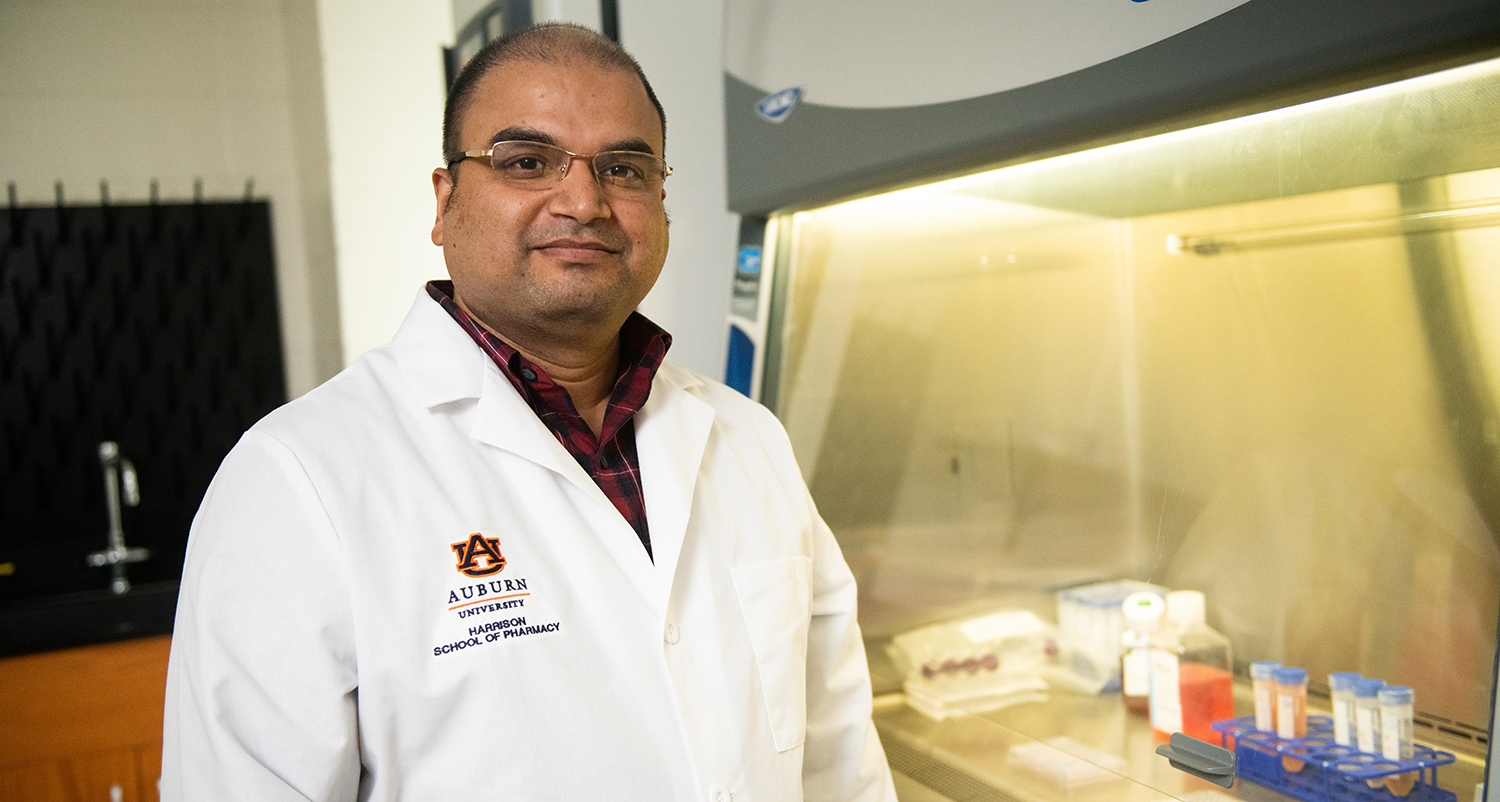 Dr. Amit Mitra, Director of the Center for Pharmacogenomics and Single-Cell Omics, stands in the lab.
Dr. Amit Mitra, Director of the Center for Pharmacogenomics and Single-Cell Omics, stands in the lab.
AUBURN, Alabama- Recognizing the importance of genomics in modern health care and a rise in precision medicine, the Auburn University Harrison School of Pharmacy created the Center for Pharmacogenomics and Single-Cell Omics Initiative, or AUPharmGx. One year later, the initiative—a first of its kind in the state of Alabama—is seeing early positive returns, placing Auburn at the forefront of the growing science.
AUPharmGx is built on advancing the study of pharmacogenomics, which is how genes affect a person’s response to drugs. It combines the study of pharmacology, the science of drugs, with genomics, the study of genes and their functions, to understand the inter-individual variations in response to drug therapies, predict whether a medication will be effective for a particular person and help prevent adverse drug reactions.
“Pharmacogenomics is the study of the contribution of genomics and of other ‘omics,’ such as epigenomics, transcriptomics, proteomics and many others to a patient’s response to drugs,” said Dr. Amit Kumar Mitra, director of AUPharmGx. “The ultimate goal is to individualize drug selection and drug use in order to maximize drug efficacy and to avoid adverse drug reactions.”
Providing state-of-the-art technologies to generate omics data, cutting-edge data analysis and facilitating collaborative research, AUPharmGx puts Auburn at the forefront of an increasingly important area of health care.
“This is the first-of-its-kind initiative in the state of Alabama, offering such a broad range of facilities under one roof aimed at pharmacogenomics research,” said Mitra. “This core facility provides all the services required in a typical pharmacogenomics study from consultation to data analysis.”
Mitra, an assistant professor in the Harrison School of Pharmacy’s Department of Drug Discovery and Development, has more than 15 years of experience in pharmacogenomics, functional genomics, molecular biology and translational research, working with next-generation methodologies to generate omics data as well as the computational and bioinformatics skill sets to analyze big data.
Prior to coming to Auburn, he spent time as a research associate at the Institute of Human Genetics and research assistant professor with the University of Minnesota’s Department of Genetics, Cell Biology and Development, as well as a senior scientist and technical lead of a multiple myeloma single-cell consortium in the pharmaceutical industry at the Celgene Corporation. Mitra has more than 60 peer-reviewed publications in internationally acclaimed scientific journals, a book chapter and two patents.
Precision medicine, also referred to as personalized or individualized medicine, is a field of medicine that focuses on the development of effective, safe medications and doses that will be tailored to a person’s genetic makeup. The goal is identifying the right drug at the right dose at the right time.
“This bench-to-bedside approach is increasingly being incorporated into mainstream clinical practice, thereby changing the way many diseases are identified, classified and treated,” said Mitra. “From helping patients live longer and healthier lives to creating a better quality of life, precision medicine strategies are bringing great value not only to patients, but also to the health care system.”
AUPharmGx helps researchers answer questions that lead to discovering novel biomarkers for disease and/or therapeutic efficacy, as well as advance our current knowledge of pharmacogenetics. Additionally, AUPharmGx also offers education and training on how to conduct proper pharmacogenomic research. including consultation on where and how to start specific projects, help in sample preparations, data generation using next-generation methods and also help in data analysis and interpretation.
The strategic investment by the Harrison School of Pharmacy, or HSOP, in AUPharmGx is providing early positive returns.
“As a health professions school with a strong commitment to advancing health and well-being in large part through pharmaceutical sciences-based research, AUPharmGx is designed to foster collaborative efforts between multidisciplinary health scientists and health care providers,” said Dr. Tim Moore, HSOP’s associate dean for research. “In less than one year of accepting projects, AUPharmGx has provided support for nearly a dozen separate research efforts, covering a wide spectrum of services, including RNA sequencing, gene expression analysis, Sanger DNA sequencing, whole-genome sequencing and microbiome analysis/metagenomics. These projects have also addressed a wide range of health issues such as Alzheimer’s disease, neurotoxicity, cancers including breast cancer, hypoxia and lung injury.
“We are also grateful for the university efforts to sustain research activities during the COVID-19 pandemic, and AUPharmGx is able to continue its work uninterrupted.”
The center offers a variety of services and resources, including:
To learn more about the Center for Pharmacogenomics and Single-Cell Omics Initiative or schedule an appointment or consultation, email aupharmgx@auburn.edu, visit wp.auburn.edu/aupharmgx/ and like on Facebook at www.facebook.com/aupharmgx.
AUPharmGx is conveniently located in the heart of the Auburn University campus within the Harrison School of Pharmacy’s Walker Building. The building is located on War Eagle Way and the Thach Concourse.
----------
Auburn University’s Harrison School of Pharmacy is ranked among the top 25 percent of all pharmacy schools in the United States, according to U.S. News & World Report. Fully accredited by the Accreditation Council for Pharmacy Education (ACPE), the School offers doctoral degrees in pharmacy (Pharm.D.) and pharmaceutical sciences (Ph.D.) while also offering a master’s in pharmaceutical sciences. The School's commitment to world-class scholarship and interdisciplinary research speaks to Auburn's overarching Carnegie R1 designation that places Auburn among the top 100 doctoral research universities in the nation. For more information about the School, please call 334.844.8348 or visit http://pharmacy.auburn.edu.